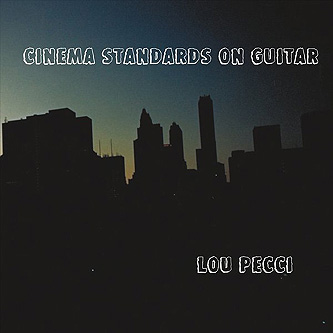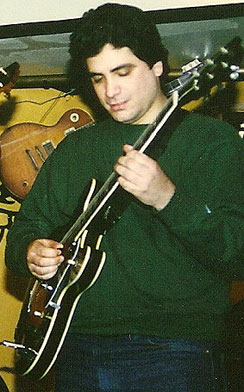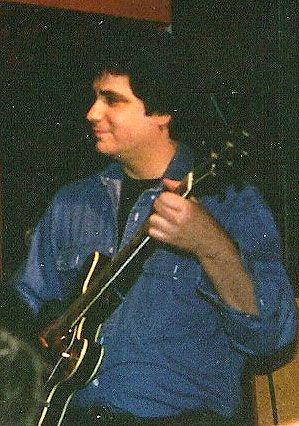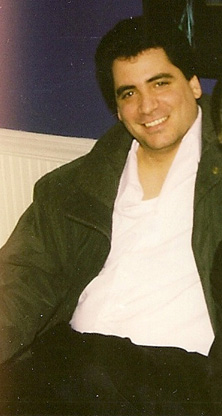 In
the hands of guitar ace Lou Pecci, classics from the great
American songbook come to life again. For his 2016 CD, Cinema
Standards On Guitar, Lou goes back in time—way
back in fact to songs that were mainly written and made popular in
the 1930’s—a
time when melodic uniqueness and content ruled the day. Lou is particularly
fond of the Rogers & Hart songbook but he also covers music of
Harold Arlen, Duke Ellington, Irving Berlin and others. Speaking about
the CD release of Cinema Standards On Guitar Lou tells mwe3.com,
"I’ve always loved playing standards, and have for a
long time now. I actually recorded this a few years ago and didn’t
know if I was going to do anything with it, until a friend heard it
and liked it, which encouraged me to put it out." More than
just another covers album, Lou points out on the CD cover art that
a few of these songs were also used in some of his favorite movies.
For example, track 3 here, Lou’s cover of the 1939 Rogers &
Hart song “I Didn’t Know What Time It Was” was featured
in the 1959 movie Pal Joey. There’s even a cover here
of “Amapola” dating back to 1922 and was covered by Ennio
Morricone in the movie Once Upon A Time In America. Lou's unique
and very cool guitar instrumental cover of Harold Arlen’s timelessly
melodic “Somewhere Over The Rainbow” (written for The
Wizard Of Oz) is a toe-tapping delight. After a few spins, the
music sinks in nicely and it’s great to hear that Lou knows his
stuff. Cinema Standards is a fresh and invigorating album of
instrumental guitar magic by one of New Jersey’s finest guitarists,
Lou Pecci. www.CDbaby.com
In
the hands of guitar ace Lou Pecci, classics from the great
American songbook come to life again. For his 2016 CD, Cinema
Standards On Guitar, Lou goes back in time—way
back in fact to songs that were mainly written and made popular in
the 1930’s—a
time when melodic uniqueness and content ruled the day. Lou is particularly
fond of the Rogers & Hart songbook but he also covers music of
Harold Arlen, Duke Ellington, Irving Berlin and others. Speaking about
the CD release of Cinema Standards On Guitar Lou tells mwe3.com,
"I’ve always loved playing standards, and have for a
long time now. I actually recorded this a few years ago and didn’t
know if I was going to do anything with it, until a friend heard it
and liked it, which encouraged me to put it out." More than
just another covers album, Lou points out on the CD cover art that
a few of these songs were also used in some of his favorite movies.
For example, track 3 here, Lou’s cover of the 1939 Rogers &
Hart song “I Didn’t Know What Time It Was” was featured
in the 1959 movie Pal Joey. There’s even a cover here
of “Amapola” dating back to 1922 and was covered by Ennio
Morricone in the movie Once Upon A Time In America. Lou's unique
and very cool guitar instrumental cover of Harold Arlen’s timelessly
melodic “Somewhere Over The Rainbow” (written for The
Wizard Of Oz) is a toe-tapping delight. After a few spins, the
music sinks in nicely and it’s great to hear that Lou knows his
stuff. Cinema Standards is a fresh and invigorating album of
instrumental guitar magic by one of New Jersey’s finest guitarists,
Lou Pecci. www.CDbaby.com
mwe3.com presents an interview with
LOU PECCI
 mwe3:
What gave you the idea to do an album of musical standards from the
1930s with the result being your excellent 2016 album Cinema Standards
on Guitar?
mwe3:
What gave you the idea to do an album of musical standards from the
1930s with the result being your excellent 2016 album Cinema Standards
on Guitar?
Lou Pecci: I’ve always loved playing standards, and
have for a long time now. I actually recorded this a few years ago
and didn’t know if I was going to do anything with it, until
a friend heard it and liked it, which encouraged me to put it out.
mwe3: Are the 1930s your favorite decade for classic American
songbook, and would you consider another Cinema Standards CD
from a different decade?
Lou Pecci: Sure, but I wouldn’t say the 1930’s are
my favorite. There’s actually one tune on this from the 1940’s
and another, “Amapola,” from the 1920’s. I could see
doing a similar one but it would just depend on when I felt like it.
You do a disc for yourself and when other people find it and like
it, it’s a nice bonus. I’ve done all of my CD’s with
that approach.
mwe3: Did you have an equal interest in the movies where these
songs were used, sometimes decades after they were written?
Lou Pecci: Some of them. Once Upon A Time in America, Sweet
And Lowdown, and Paper Moon are favorites. The others I’ve
seen once or not at all. I usually try to view the films I record
a song from, but in this case there’s a few of them I’ve
haven’t seen.
mwe3: Do you think that songs sometimes influence the movie
even more? I’m thinking of Paper Moon, and the song written
40 years before by Harold Arlen. What brought you back to “Paper
Moon”? I remember the movie being huge in 1973.
 Lou Pecci:
In some cases I would think so, but it’s not something I really
gave any thought to. I always liked “Paper Moon” and I had
an arrangement of the song I wanted to try out. Sometimes you start
changing things a little bit to keep yourself interested. Certain
tunes lend themselves to that easier than others.
Lou Pecci:
In some cases I would think so, but it’s not something I really
gave any thought to. I always liked “Paper Moon” and I had
an arrangement of the song I wanted to try out. Sometimes you start
changing things a little bit to keep yourself interested. Certain
tunes lend themselves to that easier than others.
mwe3: How about your version of “I Didn’t Know What
Time It Was” from the 1959 movie Pal Joey? You do a very
unusual treatment of that track, which works great! Funny how the
song was used in the movie 20 years after it was written. Who did
it first and do you have a favorite other version of this track?
Lou Pecci: Thank you. I’ve always liked playing it with
a little dark mood, especially on solo guitar, although it’s
done as a duet on the CD. I remember hearing it by Sinatra, Bobby
Darin, and Charlie Parker on his Strings album growing up,
but dozens of people have recorded it. As to who did it first, Benny
Goodman, Jimmy Dorsey, and Artie Shaw all did it around the same time
in 1939 when it was first written.
mwe3: What about the CD closing with “Little Drummer Boy”,
that’s a different kind of “standard” in that it’s
not often used in movies. I didn’t know it was written in 1941.
You do a very different kind of version, which is nice. It’s
also used in the 1999 movie True Crime?
Lou Pecci: Yes, you can hear it the end of the flick, which
is the only one I could find that used the tune. I wanted to use it
as I don’t plan on doing a Christmas CD in the near future. I
must admit I’m taking license a bit to call it a cinema standard,
but what the hell. I could have called the disc “Standards in
Film on Guitar” or something like that, which would have been
a little more accurate overall, but I just liked this title better,
being a bit of a cinema buff. It didn’t matter to me that a lot
of these tunes were written for the stage and used in movies here
and there later on.
 mwe3:
“Love for Sale” is given a rather modern, Shadows feel.
You did a great job on the Cole Porter tune, you make it sound…different.
What about the movie “DeLovely?” Tell us about your
other favorite Cole Porter songs.
mwe3:
“Love for Sale” is given a rather modern, Shadows feel.
You did a great job on the Cole Porter tune, you make it sound…different.
What about the movie “DeLovely?” Tell us about your
other favorite Cole Porter songs.
Lou Pecci: That’s one of the films I didn’t see,
but it’s one of the rare times a movie has used “Love For
Sale.” The song has an interesting history, being banned due
to its reference to prostitution. But anyway, I think my other favorites
of his are “Every Time We Say Goodbye,” “Begin the
Beguine,” and “You’d Be So Nice to Come Home To.”
There’s so many of them it’s hard to choose only a few.
mwe3: Anything else new in the guitar world for you? What guitars
are you playing mostly on Cinema Standards on Guitar?
Lou Pecci: A Gibson 335 on all of it except for “Cheek
To Cheek” where I used a Godin Nylon String. There’s nothing
new going on at the moment, but I’m sure there will be sooner
or later.
mwe3: You didn’t sound too thrilled about the future of
recorded music but you continue making great albums of guitar magic.
Is there a way to salvage our collective musical futures and what
other ideas are brewing for you this year?
Lou Pecci: Well, I’m probably the last guy to ask about
this stuff, as I don’t make my living in the music business,
but it’s pretty clear what’s going on. According to a recent
ASCAP article music is now a 15 billion dollar industry, down from
30 billion in 1999. Just as an observer, a fifty percent decline in
17 years is pretty drastic and not a good sign for the future of any
business, especially when it’s unintended. Due to streaming and
all of the rest of it, recordings lose money now more than ever before.
 But
regardless, I’m thinking of ideas for the next disc at the moment,
as I enjoy playing and recording too much not to keep doing it. Since
most musicians feel likewise, that’s probably the way to “salvage
our collective musical futures.” In the end, either you’re
a player or you’re not a player.
But
regardless, I’m thinking of ideas for the next disc at the moment,
as I enjoy playing and recording too much not to keep doing it. Since
most musicians feel likewise, that’s probably the way to “salvage
our collective musical futures.” In the end, either you’re
a player or you’re not a player.



